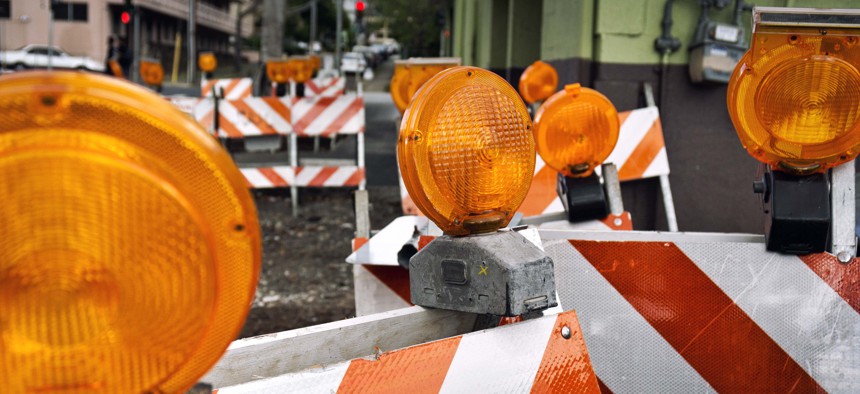New RAND Study Pushes Back on Descriptions of Widespread Crumbling Infrastructure in U.S.

Construction barricades. Shutterstock / cleanfotos

Connecting state and local government leaders
The report includes recommendations for Congress to consider as lawmakers develop future public works policy.
Claims that U.S. transportation and water infrastructure is crumbling and that spending on these public works has fallen steeply are frequently overstated and lacking in nuance, a new study suggests.
Researchers at the RAND Corporation acknowledge in a report released Tuesday that there are maintenance backlogs and other problems with infrastructure in places around the U.S.
That said, the researchers make a case that “the perception that U.S. infrastructure needs are not being met, which animates so much of the debate over spending, requires reexamination."
"Not all transportation and water infrastructure in the United States is falling apart—far from it," the report adds. "Data do not support a picture of precipitous decline in total national spending or in the condition of the assets."
The study comes as the Trump administration and members of Congress are contemplating an infrastructure investment package.
Over the past 60 years, the RAND researchers note, public spending on infrastructure in the U.S. has generally tracked with economic growth.
Between 1964 and 1980, total public highway spending decreased as a percentage of gross domestic product and has remained relatively flat since, according to the study. Spending on transit, rail and water systems increased or stayed roughly level between 1980 and 2014.
States and localities, as opposed to the federal government, have in recent years covered the majority of the cost for capital spending, operations and maintenance for transportation and water infrastructure, the report points out.
The researchers highlight some of the more difficult problems that currently exist when it comes to the nation’s public works.
For instance, declines in gas tax revenues to support federal transportation spending, difficulties completing major regional projects, like a new rail tunnel under the Hudson River connecting New York City and New Jersey, and eroding tax bases in some places.
But the report emphasizes:
Each place has its own blend of issues with infrastructure maintenance or investment, economics or governance. Dysfunction arises from many sources. An across-the-board ramp-up of federal spending is unlikely to solve the infrastructure problems that need fixing—regardless of whether the money comes through direct funding, tax credits to private developers, or a combination. Lasting changes will require thoughtful consideration of targeted spending priorities, policy constraints, and regional differences.
The researchers offer recommendations for Congress. Among them:
- Preserve the federal tax exemption on interest earned from municipal bonds for at least the next decade.
- Reinstate Build America Bonds with taxable interest for 10 years and experiment with other financing alternatives.
- Support state experimentation with mileage-based fee collection to support highway funding.
- Target longer-term projects likely to produce significant national benefits, productivity increases and greater resilience, instead of “shovel-ready” projects.
- Focus on capital investment, including major investments in upgrading aging infrastructure and new infrastructure that incorporates advanced technologies.
- Prioritize maintenance of federal assets, such as military bases, dams, levees, locks and national parks.
- Make resilience to natural disasters and adaptation to rising seas, increasing flood risks, and the changing climate a condition for capital investments, in order to reduce future federal spending on disaster assistance.
- Streamline the regulatory review process.
- Consolidate the U.S. Army Corps of Engineers and the U.S. Bureau of Reclamation into an integrated national water resource agency.
- Fund competitive grants for research, development, and deployment of new technologies.
Debra Knopman, a principal researcher at RAND, was the lead author of the study.
“Spreading federal dollars around to fund short-term, 'shovel-ready' projects without a sense of national purpose or priority will not get the nation where it needs to be,” she said in a statement.
A full copy of the report can be found here.
Bill Lucia is a Senior Reporter for Government Executive's Route Fifty and is based in Washington, D.C.

NEXT STORY: ‘Money in the Meter’ for Revitalizing America's Airports





